Unit 1 Section A Grammar Focus-3C课件2022-2023学年人教版英语八年级上册(共28张PPT)
文档属性
| 名称 | Unit 1 Section A Grammar Focus-3C课件2022-2023学年人教版英语八年级上册(共28张PPT) | 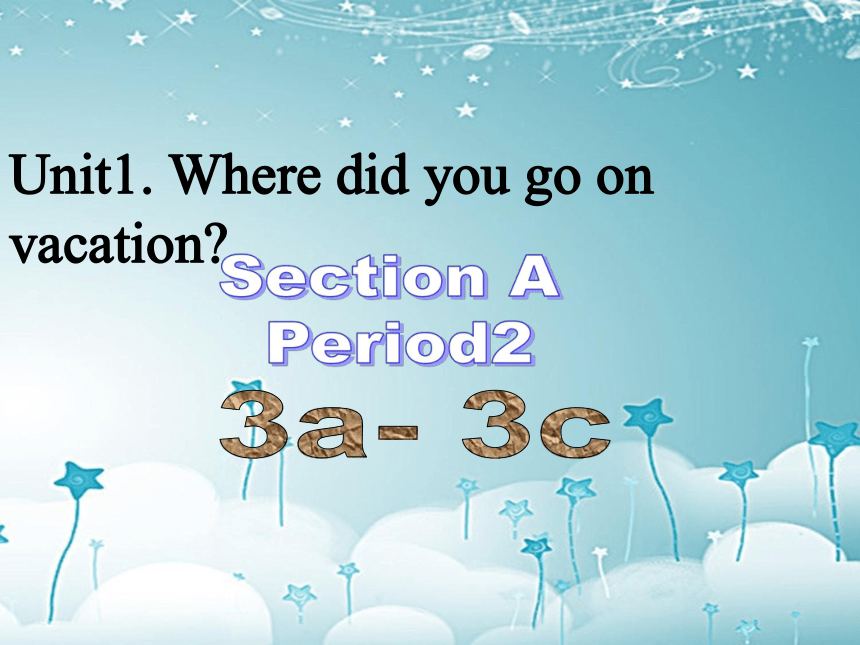 | |
| 格式 | pptx | ||
| 文件大小 | 487.3KB | ||
| 资源类型 | 教案 | ||
| 版本资源 | 人教新目标(Go for it)版 | ||
| 科目 | 英语 | ||
| 更新时间 | 2022-09-06 11:09:10 | ||
图片预览

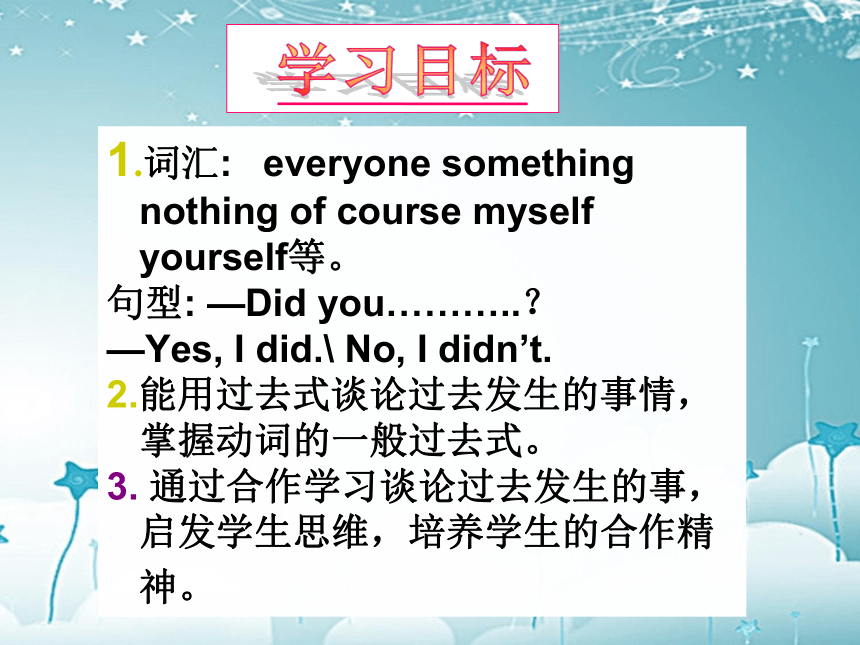
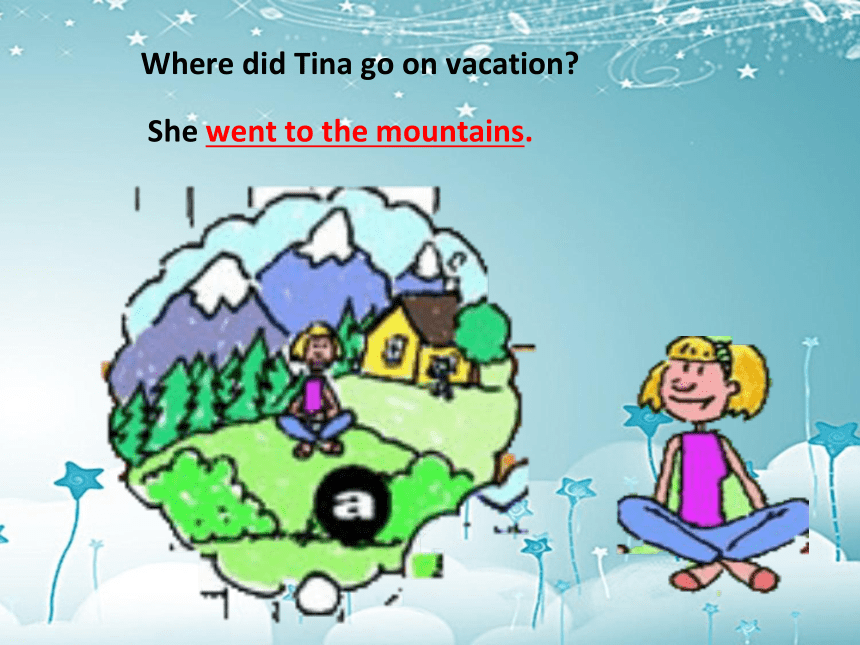
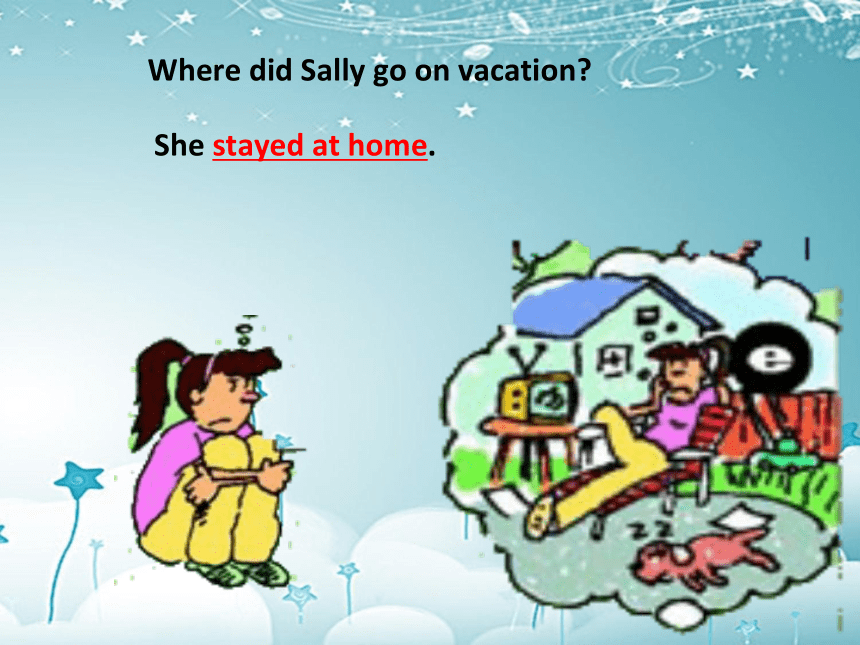
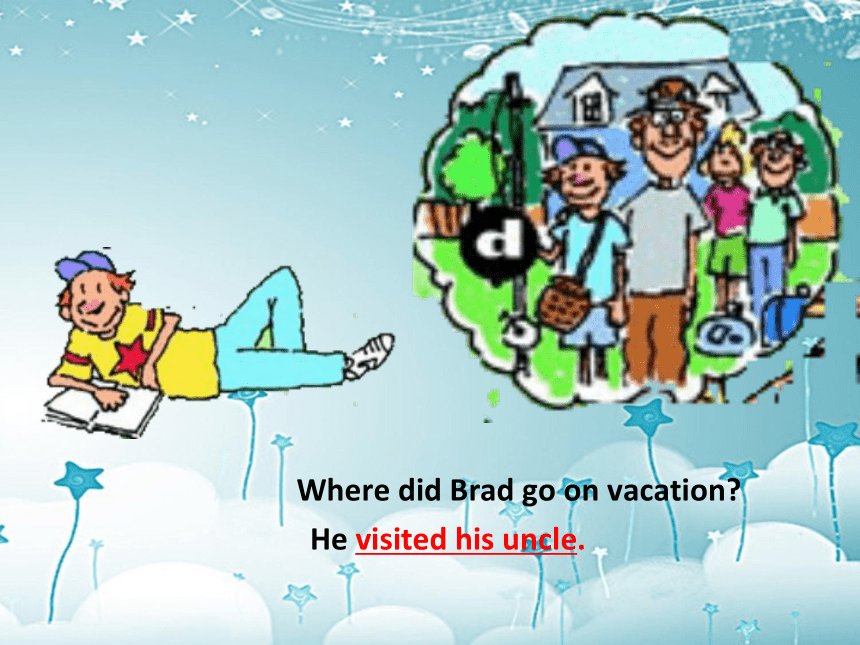
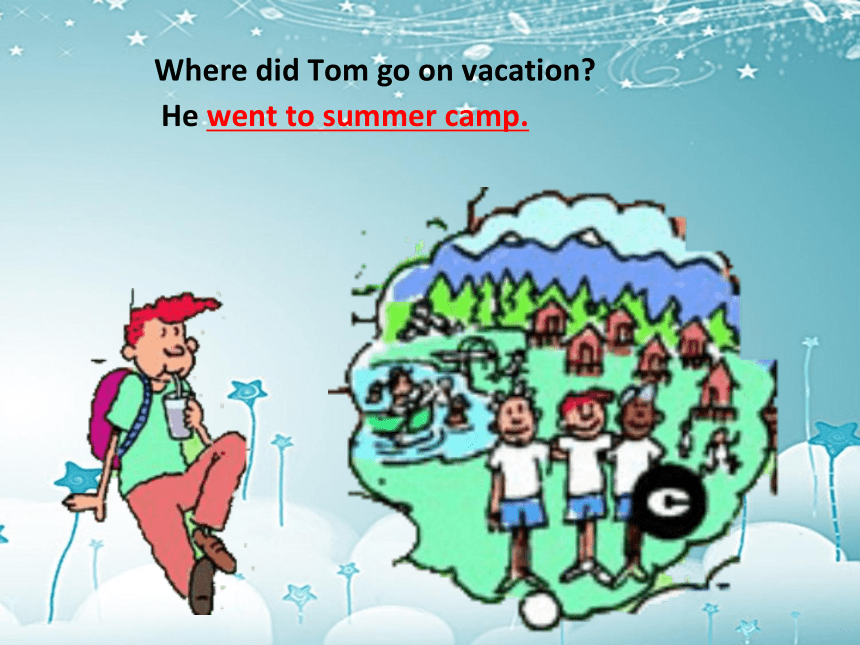
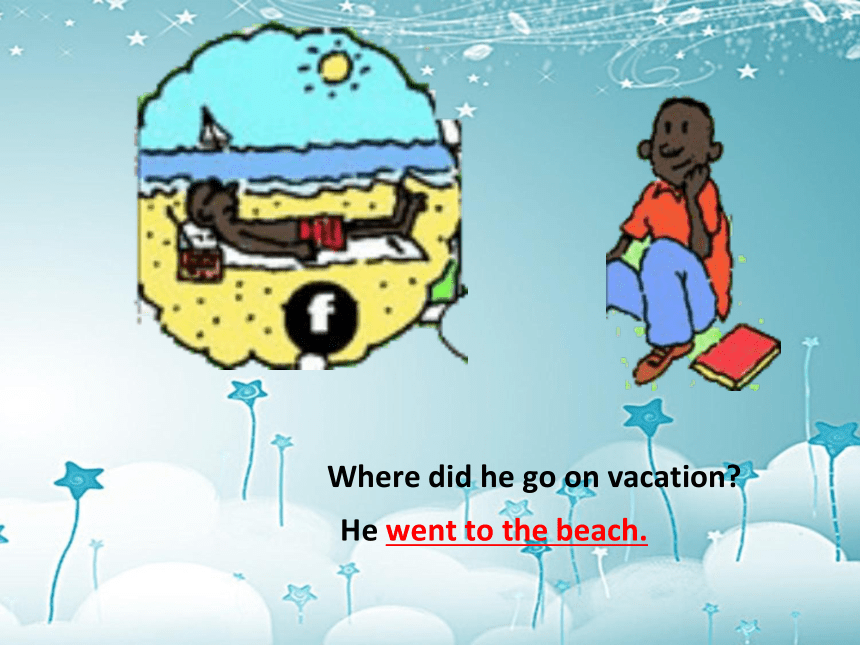

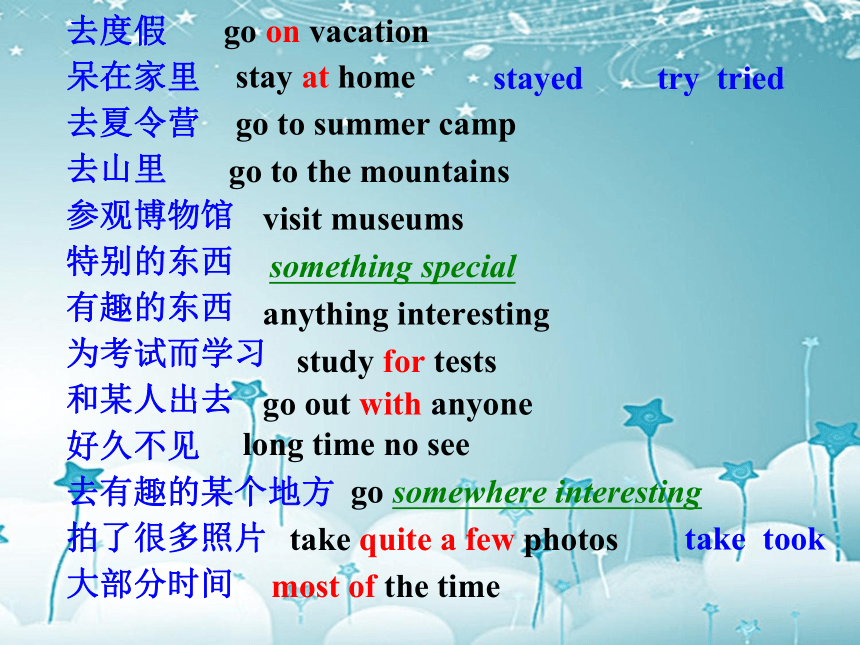
文档简介
(共28张PPT)
Unit1. Where did you go on vacation
Section A
Period2
3a- 3c
学习目标
1.词汇: everyone something nothing of course myself yourself等。
句型: —Did you………..?
—Yes, I did.\ No, I didn’t.
2.能用过去式谈论过去发生的事情,掌握动词的一般过去式。
3. 通过合作学习谈论过去发生的事,启发学生思维,培养学生的合作精神。
Where did Tina go on vacation
She went to the mountains.
Where did Sally go on vacation
She stayed at home.
Where did Brad go on vacation
He visited his uncle.
Where did Tom go on vacation
He went to summer camp.
Where did he go on vacation
He went to the beach.
Grammar Focus
Where did you go on vacation I went to New York City.
Did you go out with anyone No. No one was here. Everyone was on vacation.
Did you buy anything special Yes, I bought something for my father.
No, I bought nothing.
How was the food Everything tasted really good!
Did everyone have a good time Oh, yes. Everything was excellent.
去度假
呆在家里
去夏令营
去山里
参观博物馆
特别的东西
有趣的东西
为考试而学习
和某人出去
好久不见
去有趣的某个地方
拍了很多照片
大部分时间
go on vacation
stay at home
go to summer camp
go to the mountains
visit museums
something special
anything interesting
study for tests
go out with anyone
long time no see
go somewhere interesting
take quite a few photos
most of the time
stayed
try tried
take took
A: Hi, Lucy. How___ you
B: I ___ fine, thank you. How ___ your vacation
A: It ___ interesting.
B: Really Where ___ you go on vacation
A: I ____ to the mountains.
B: ___ you see the monkey
A: Yes, I did. /No, I didn’t.
are
am
was
was
did
went
Did
Fill in the blanks:
Exercises
Amy: How ___ your vacation, Lin
Lin: It ____ pretty good.
Amy: How_____ the beaches
Lin: They ____ fantastic.
Amy: How ___ the weather
Lin: It ___ hot and humid.
Amy: How_____ the people
Lin: They ____ unfriendly.
Fill in the blanks with “was” or “were”
was
was
was
were
were
were
were
was
Grammar:复合不定代词
不指明替代某个(些)人、某个(些)事物的代词叫做不定代词。some、any、no和every一般可以和one、body、thing连用,构成复合不定代词。
some any no every
人 someone anyone no one everyone
物 something anything nothing everything
(1)复合不定代词作主语时,谓语动词用第三人称单数形式。
e.g.:
Something is wrong with my watch.我的手表有故障。
Everyone is here.大家都来了。
(2)除no one以外,其他复合不定代词都可以写成一个词。
(3)形容词修饰不定代词时应该放在不定代词后。
e.g.:Did you see anything interesting at the cinema?在电影院里你看见了有趣的东西吗?
He met someone special.他遇见了特殊的人。
(4)some/any 复合不定代词的用法与some/any用法基本一致。肯定句以及期待对方肯定回答的疑问句中通常用some。
e.g.:Would you like something to eat?你要一些吃的东西吗?
I don't know anything about it.我什么也不知道。
Grammar:复合不定代词
some someone= somebody 某人 something
某事,某物
any anyone= anybody 任何人 anything
任何事情
no no one= nobody 没有什么人 nothing
没有什么事
every everyone= everybody 人人, 每个人 everything
一切事物
somewhere 某地 anywhere 任何地方 nowhere 没有地方 everywhere
每个地方
不定代词
不定地点副词
1. I can’t hear anything = I can hear _________.
2. There is __________ on the floor. Please pick it up.
3. Did _____ go to play basketball with you
4. I phoned you last night, but ________ answered it.
5. I don’t think ________ telephoned.
9. Don’t worry. There’s ________ wrong with your ears.
10. There’s _______ in the box. It’s empty.
11. Maybe __________ put my pencil _________.
I can’t find it _________.
巩固练习:用不定代词或不定副词填空
nothing
something
anyone
nobody
anybody
nothing
nothing
someone
somewhere
anywhere
一般过去时:
一般过去时常表示过去某一时间所发生的动作或存在的状态。一般过去时常和表示过去的是状语连用。
构成形式:
肯定式: I cried.
否定式: I did not (didn’t) cry.
疑问式: Did I cry
1、一般加ed : visit - visited
2、以e结尾的加d: dance - danced
3、以辅音字母加y结尾的改y为i加ed:
study - studied
4、以辅元辅结尾的重读闭音节,双写末尾的
辅音字母加ed: stop - stopped
过去式动词的变化
规则变化 (regular change)
不规则变化 (irregular change)
1、没有变化,如: cut -cut ,let-let,read-read
2、改变元音的,如: write - wrote
3、元音和辅音都有改变的,如:
buy - bought
3a
Fill in the blanks with the words in the box
And practice the conversation
Linda: Did you do________ fun on your vacation, Alice
Alice: yes, I did. I went to Sanya.
Linda: How did you like it
Alice: Well, it was my first time there.
So __________ was really interesting.
Linda: Did you go with__________
Alice: Yes, I did. I went with my sister.
Linda: Did you go shopping
Alice: of course. I bought _________ for my parents, but
__________ for myself.
Linda: Why didn’t you buy__________ for yourself
Alice: I didn’t really see _________ I liked.
anything
everything
anyone
something
anything
nothing
anything
anyone
something
anything
everything
nothing
3b
Fill in the blanks in the e-mail message
with the words in the box
anything, everything,
nothing ,everyone , no one
Dear Bill,
How was your vacation Did you do _________ interesting Did __________ in the family go with you I went to a friend’s farm in the countryside with my family.__________ was great. We fed some hens and saw some baby pigs. They were so cute! The only problem was that there was __________ much to do in the evening but read. Still ___________ seemed to be bored. Bye for now.
Mark
anything
everyone
everything
nothing
No one
1.Everything tasted really good!所有的东西尝起来真的很好吃!
taste在此为系动词,意为“尝起来”,其后接形容词。
a. The food tastes really great.食物尝起来棒极了。
b. The milk tasted terrible.牛奶尝起来很糟糕。
2.Did everyone have a good time 大家玩得开心吗
have a good time
= enjoy oneself
= have fun 玩得开心 (+ doing)
eg: We had a good time visiting the Great Wall.
= We ______ ________ ______the the Great Wall.
= We ____ _____ _____the Great Wall.
enjoyed ourselves visiting
had fun visiting
Language points
3.How did you like it 你觉得它怎么样?
How do/did you like… “你觉得…怎样?”,
用来询问对方的观点或看法,相当于
What do you think of…
或How do you feel about…
eg: How do you like your new job
= ____ ___ ____ _____ __ your new job
= _____ _____ _____ _____ _____ your new job
What do you think of
How do you feeling about
4.Did you go shopping 你们去购物了吗?
go shopping意为“去购物;去买东西”,
do some shopping.(同义短语)
eg: I usually go shopping on Sundays.
我通常星期天去购物。
拓展:“go + doing”形式表示“去做某事”,
常用于表达从事某一体育活动或休闲活动。
go bike riding 骑自行车旅行 go climbing去爬山
go skating去滑冰 go hiking去远足
go sightseeing去观光 go fishing去钓鱼
go swimming去游泳 go camping去野
go boating去划船 go surfing去冲浪
go skateboarding去进行滑板运动
7.Still no one seemed to be bored.
(即使这样)仍然没有人看起来无聊。
1)seem不及物动词或系动词,“好像;似乎;看来”。
eg:Everything seems easy.一切似乎很容易。
拓展:a. seem+adj.“看起来……”。
You seem happy today.你今天看起来很高兴。
b. seem+to do sth.“似乎,好像做某事”。
I seem to have a cold.我似乎感冒了。
c. It seems/seemed+从句 “看起来好像…;似乎…”。
It seems that no one believes you.
看起来好像没有人相信你。
d. seem like…“好像,似乎……”。
It seems like a good idea.它好像是个好主意。
8.Still no one seemed to be bored.
(即使这样)仍然没有人看起来无聊。
2)辨析:bored与boring
a. bored意为“厌烦的;感到无聊的”,
一般在句中修饰人,作表语
b. boring意为“无聊的;令人厌烦的”,
一般在句中修饰事或物,可作表语和定语
eg:a. I’m _____ with what he said.
我对他说的话厌烦极了。
b. I find the story very _____.
我发现这个故事太无聊了
bored
boring
3c
Ask your group questions about their last vacation. Then tell the class your results.
Did you… Everyone Someone No one
eat anything at a restaurant
read anything interesting
visit anyone in your family
buy anything
keep a diary
Report like this:
In our group, everyone ate something at a restaurant …
选词填空。
something, anyone, everything, anything, nothing, someone, no one, every one
_________ found Mr. Li’s keys and gave them back to him yesterday.
2. ─ Did you see _________ in the big box
─ No, I didn’t. There’s _______ in it.
_________ helped the little boy. He did it himself.
nothing
Someone
No one
anything
Exercise
4. My watch doesn’t work. ___________ is wrong with it.
5. ─ Hello, ___________!
─ Hello, Mr. Smith!
6. ─ How’s it going, Jack
─ Great! ____________ is going well.
7. ─ Did you go to the beach with
_______
─ Yes. I went there with my cousin.
anyone
Everything
everyone
Something
Unit1. Where did you go on vacation
Section A
Period2
3a- 3c
学习目标
1.词汇: everyone something nothing of course myself yourself等。
句型: —Did you………..?
—Yes, I did.\ No, I didn’t.
2.能用过去式谈论过去发生的事情,掌握动词的一般过去式。
3. 通过合作学习谈论过去发生的事,启发学生思维,培养学生的合作精神。
Where did Tina go on vacation
She went to the mountains.
Where did Sally go on vacation
She stayed at home.
Where did Brad go on vacation
He visited his uncle.
Where did Tom go on vacation
He went to summer camp.
Where did he go on vacation
He went to the beach.
Grammar Focus
Where did you go on vacation I went to New York City.
Did you go out with anyone No. No one was here. Everyone was on vacation.
Did you buy anything special Yes, I bought something for my father.
No, I bought nothing.
How was the food Everything tasted really good!
Did everyone have a good time Oh, yes. Everything was excellent.
去度假
呆在家里
去夏令营
去山里
参观博物馆
特别的东西
有趣的东西
为考试而学习
和某人出去
好久不见
去有趣的某个地方
拍了很多照片
大部分时间
go on vacation
stay at home
go to summer camp
go to the mountains
visit museums
something special
anything interesting
study for tests
go out with anyone
long time no see
go somewhere interesting
take quite a few photos
most of the time
stayed
try tried
take took
A: Hi, Lucy. How___ you
B: I ___ fine, thank you. How ___ your vacation
A: It ___ interesting.
B: Really Where ___ you go on vacation
A: I ____ to the mountains.
B: ___ you see the monkey
A: Yes, I did. /No, I didn’t.
are
am
was
was
did
went
Did
Fill in the blanks:
Exercises
Amy: How ___ your vacation, Lin
Lin: It ____ pretty good.
Amy: How_____ the beaches
Lin: They ____ fantastic.
Amy: How ___ the weather
Lin: It ___ hot and humid.
Amy: How_____ the people
Lin: They ____ unfriendly.
Fill in the blanks with “was” or “were”
was
was
was
were
were
were
were
was
Grammar:复合不定代词
不指明替代某个(些)人、某个(些)事物的代词叫做不定代词。some、any、no和every一般可以和one、body、thing连用,构成复合不定代词。
some any no every
人 someone anyone no one everyone
物 something anything nothing everything
(1)复合不定代词作主语时,谓语动词用第三人称单数形式。
e.g.:
Something is wrong with my watch.我的手表有故障。
Everyone is here.大家都来了。
(2)除no one以外,其他复合不定代词都可以写成一个词。
(3)形容词修饰不定代词时应该放在不定代词后。
e.g.:Did you see anything interesting at the cinema?在电影院里你看见了有趣的东西吗?
He met someone special.他遇见了特殊的人。
(4)some/any 复合不定代词的用法与some/any用法基本一致。肯定句以及期待对方肯定回答的疑问句中通常用some。
e.g.:Would you like something to eat?你要一些吃的东西吗?
I don't know anything about it.我什么也不知道。
Grammar:复合不定代词
some someone= somebody 某人 something
某事,某物
any anyone= anybody 任何人 anything
任何事情
no no one= nobody 没有什么人 nothing
没有什么事
every everyone= everybody 人人, 每个人 everything
一切事物
somewhere 某地 anywhere 任何地方 nowhere 没有地方 everywhere
每个地方
不定代词
不定地点副词
1. I can’t hear anything = I can hear _________.
2. There is __________ on the floor. Please pick it up.
3. Did _____ go to play basketball with you
4. I phoned you last night, but ________ answered it.
5. I don’t think ________ telephoned.
9. Don’t worry. There’s ________ wrong with your ears.
10. There’s _______ in the box. It’s empty.
11. Maybe __________ put my pencil _________.
I can’t find it _________.
巩固练习:用不定代词或不定副词填空
nothing
something
anyone
nobody
anybody
nothing
nothing
someone
somewhere
anywhere
一般过去时:
一般过去时常表示过去某一时间所发生的动作或存在的状态。一般过去时常和表示过去的是状语连用。
构成形式:
肯定式: I cried.
否定式: I did not (didn’t) cry.
疑问式: Did I cry
1、一般加ed : visit - visited
2、以e结尾的加d: dance - danced
3、以辅音字母加y结尾的改y为i加ed:
study - studied
4、以辅元辅结尾的重读闭音节,双写末尾的
辅音字母加ed: stop - stopped
过去式动词的变化
规则变化 (regular change)
不规则变化 (irregular change)
1、没有变化,如: cut -cut ,let-let,read-read
2、改变元音的,如: write - wrote
3、元音和辅音都有改变的,如:
buy - bought
3a
Fill in the blanks with the words in the box
And practice the conversation
Linda: Did you do________ fun on your vacation, Alice
Alice: yes, I did. I went to Sanya.
Linda: How did you like it
Alice: Well, it was my first time there.
So __________ was really interesting.
Linda: Did you go with__________
Alice: Yes, I did. I went with my sister.
Linda: Did you go shopping
Alice: of course. I bought _________ for my parents, but
__________ for myself.
Linda: Why didn’t you buy__________ for yourself
Alice: I didn’t really see _________ I liked.
anything
everything
anyone
something
anything
nothing
anything
anyone
something
anything
everything
nothing
3b
Fill in the blanks in the e-mail message
with the words in the box
anything, everything,
nothing ,everyone , no one
Dear Bill,
How was your vacation Did you do _________ interesting Did __________ in the family go with you I went to a friend’s farm in the countryside with my family.__________ was great. We fed some hens and saw some baby pigs. They were so cute! The only problem was that there was __________ much to do in the evening but read. Still ___________ seemed to be bored. Bye for now.
Mark
anything
everyone
everything
nothing
No one
1.Everything tasted really good!所有的东西尝起来真的很好吃!
taste在此为系动词,意为“尝起来”,其后接形容词。
a. The food tastes really great.食物尝起来棒极了。
b. The milk tasted terrible.牛奶尝起来很糟糕。
2.Did everyone have a good time 大家玩得开心吗
have a good time
= enjoy oneself
= have fun 玩得开心 (+ doing)
eg: We had a good time visiting the Great Wall.
= We ______ ________ ______the the Great Wall.
= We ____ _____ _____the Great Wall.
enjoyed ourselves visiting
had fun visiting
Language points
3.How did you like it 你觉得它怎么样?
How do/did you like… “你觉得…怎样?”,
用来询问对方的观点或看法,相当于
What do you think of…
或How do you feel about…
eg: How do you like your new job
= ____ ___ ____ _____ __ your new job
= _____ _____ _____ _____ _____ your new job
What do you think of
How do you feeling about
4.Did you go shopping 你们去购物了吗?
go shopping意为“去购物;去买东西”,
do some shopping.(同义短语)
eg: I usually go shopping on Sundays.
我通常星期天去购物。
拓展:“go + doing”形式表示“去做某事”,
常用于表达从事某一体育活动或休闲活动。
go bike riding 骑自行车旅行 go climbing去爬山
go skating去滑冰 go hiking去远足
go sightseeing去观光 go fishing去钓鱼
go swimming去游泳 go camping去野
go boating去划船 go surfing去冲浪
go skateboarding去进行滑板运动
7.Still no one seemed to be bored.
(即使这样)仍然没有人看起来无聊。
1)seem不及物动词或系动词,“好像;似乎;看来”。
eg:Everything seems easy.一切似乎很容易。
拓展:a. seem+adj.“看起来……”。
You seem happy today.你今天看起来很高兴。
b. seem+to do sth.“似乎,好像做某事”。
I seem to have a cold.我似乎感冒了。
c. It seems/seemed+从句 “看起来好像…;似乎…”。
It seems that no one believes you.
看起来好像没有人相信你。
d. seem like…“好像,似乎……”。
It seems like a good idea.它好像是个好主意。
8.Still no one seemed to be bored.
(即使这样)仍然没有人看起来无聊。
2)辨析:bored与boring
a. bored意为“厌烦的;感到无聊的”,
一般在句中修饰人,作表语
b. boring意为“无聊的;令人厌烦的”,
一般在句中修饰事或物,可作表语和定语
eg:a. I’m _____ with what he said.
我对他说的话厌烦极了。
b. I find the story very _____.
我发现这个故事太无聊了
bored
boring
3c
Ask your group questions about their last vacation. Then tell the class your results.
Did you… Everyone Someone No one
eat anything at a restaurant
read anything interesting
visit anyone in your family
buy anything
keep a diary
Report like this:
In our group, everyone ate something at a restaurant …
选词填空。
something, anyone, everything, anything, nothing, someone, no one, every one
_________ found Mr. Li’s keys and gave them back to him yesterday.
2. ─ Did you see _________ in the big box
─ No, I didn’t. There’s _______ in it.
_________ helped the little boy. He did it himself.
nothing
Someone
No one
anything
Exercise
4. My watch doesn’t work. ___________ is wrong with it.
5. ─ Hello, ___________!
─ Hello, Mr. Smith!
6. ─ How’s it going, Jack
─ Great! ____________ is going well.
7. ─ Did you go to the beach with
_______
─ Yes. I went there with my cousin.
anyone
Everything
everyone
Something
同课章节目录
- Unit 1 Where did you go on vacation?
- Section A
- Section B
- Unit 2 How often do you exercise?
- Section A
- Section B
- Unit 3 I'm more outgoing than my sister.
- Section A
- Section B
- Unit 4 What's the best movie theater?
- Section A
- Section B
- Unit 5 Do you want to watch a game show?
- Section A
- Section B
- Unit 6 I'm going to study computer science.
- Section A
- Section B
- Unit 7 Will people have robots?
- Section A
- Section B
- Unit 8 How do you make a banana milk shake?
- Section A
- Section B
- Unit 9 Can you come to my party?
- Section A
- Section B
- Unit 10 If you go to the party, you'll have a grea
- Section A
- Section B
